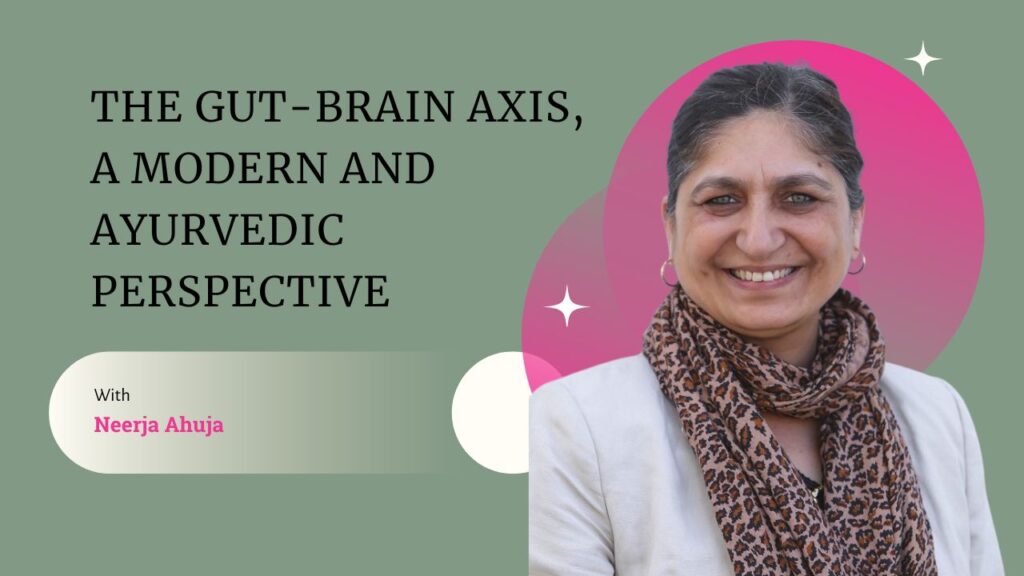Did you know your gut and brain constantly communicate, shaping everything from your mood and energy levels to your overall well-being? This intricate relationship, often called the gut-brain connection, is vital in how we feel, think, and function each day.
In this video, we’ll dive deep into this fascinating link—combining insights from modern science with the time-tested wisdom of Ayurveda. You’ll learn how digestion and mental health are intertwined, why your food affects more than just your body, and how small, mindful choices can help you restore balance, improve focus, and elevate your overall health.
By understanding this connection, you can take simple yet powerful steps to nurture both your gut and your mind; leading to better digestion, reduced stress, and a more vibrant, balanced life.
Let’s explore how you can harness this knowledge to feel your best, inside and out!
Modern Science and the Gut-Brain Connection
Modern research has discovered that our gut and brain are in constant conversation through what is known as the gut-brain axis. One striking fact is that nearly 90% of serotonin, the “feel-good” neurotransmitter, is produced in our digestive tract. This means that a healthy gut does far more than process food, it also sends signals that promote a calm, balanced state of mind. When your gut is in good health, your brain receives clear, positive messages that help improve your mood, improve energy levels, and enhance mental clarity. Also, when the gut is out of balance, these signals can lead to anxiety, irritability, or even depression.
This modern understanding complements ancient Ayurvedic wisdom, which has long recognised that the state of our digestion directly influences our mental and emotional health. Both perspectives emphasise that taking care of our gut is a key step toward overall well-being.
Ayurvedic Insights – Agni, Ama, and the Three Gunas
In Ayurveda, the digestive process is considered the key to health. Central to this is the concept of Agni, or digestive fire, which is responsible for breaking down food and transforming it into vital energy. When Agni is strong, food is digested efficiently, and the body is nourished both physically and emotionally. However, when Agni is weak, undigested food can accumulate and form Ama, a toxic residue that clouds the body and mind. Ama can lead to sluggish digestion, mental fog, and emotional imbalance.
Ayurveda also explains the quality of our mental state through the lens of the three gunas
- Sattva represents clarity, purity, peace and harmony. A Sattvic mind is calm, focused, and joyful.
- Rajas stands for activity and restlessness. While necessary for action, an excess of Rajas can lead to anxiety and agitation.
- Tamas is linked to inertia and dullness, often resulting in lethargy or a heavy, depressed state.
When your digestive system is balanced, characterised by strong Agni and minimal Ama, it encourages a Sattvic state of mind. This means that you naturally experience clarity, calm, and emotional resilience. The quality of the food you eat also plays a crucial role. Foods that are inherently Sattvic (fresh, light, and pure) help elevate your mind, while Rajasic or Tamasic foods (spicy, processed, or heavy) can disrupt this balance and lead to emotional disturbances.
Practical Strategies for a Balanced Gut and Mind
Understanding the gut-brain axis is the first step, the next is applying this knowledge in your daily life. Here are some practical Ayurvedic strategies to support both your digestive health and emotional well-being:
1. Choose a Warm, Nourishing Diet
Go for warm, cooked meals that are gentle on your digestive system. Dishes like vegetable stews, whole grains, and lightly spiced legumes not only nourish your body but also help ignite your Agni. Using digestive spices like ginger, cumin, fennel, turmeric, and black pepper can also stimulate digestion and prevent the buildup of Ama. These foods create a solid foundation for a clear, balanced mind.
2. Practice Mindful Eating
Mindful eating is about being fully present with your food. Set aside distractions, sit comfortably, and take your time to enjoy each bite. Chewing slowly not only enhances digestion but also allows your body to fully process and absorb the nutrients from your meal. This practice sends calming signals to your brain, helping maintain a Sattvic state of mind.
3. Establish a Consistent Daily Routine (Dinacharya)
A regular daily routine is a foundation of Ayurvedic living. Waking up at the same time, starting your day with warm water or herbal tea, and eating meals at consistent times helps regulate your digestive fire. This consistency not only improves digestion but also stabilises your mood, reducing stress and promoting overall balance.
4. Incorporate Gentle Movement and Relaxation
Physical activity, such as a gentle walk or yoga, can improve digestion by stimulating circulation and helping the body manage stress. Additionally, incorporating breathing exercises (pranayama) into your routine can calm the nervous system and further support the gut-brain connection. Even a few minutes of focused, deep breathing can reduce cortisol levels and promote a sense of inner calm.
5. Support Your Body with Herbal Remedies
Herbs have been used in Ayurveda for centuries to promote both digestive and mental clarity. Triphala is a renowned herbal blend that gently cleanses the digestive tract, helping to remove Ama and strengthen Agni. Ashwagandha is another powerful herb, known for its ability to reduce stress and support mental clarity. Brahmi is known for improving concentration and calming the mind. These herbal supports can be a valuable addition to your daily routine, always remember to consult with a qualified practitioner before starting any new herbs.
Conclusion
The gut-brain axis is a powerful reminder that our physical and emotional well-being are deeply intertwined. Modern science confirms what Ayurveda has taught for thousands of years, a healthy gut lays the foundation for a balanced, joyful mind. By nurturing your Agni, preventing the buildup of Ama, and choosing foods that promote Sattva, you create the conditions for a calm, clear, and resilient state of mind.
Incorporate warm, nourishing foods, practice mindful eating, establish a consistent routine, and consider supportive herbs as part of your daily life. These simple yet profound strategies can help you break free from mood imbalances and stress, paving the way for overall vitality and happiness.




